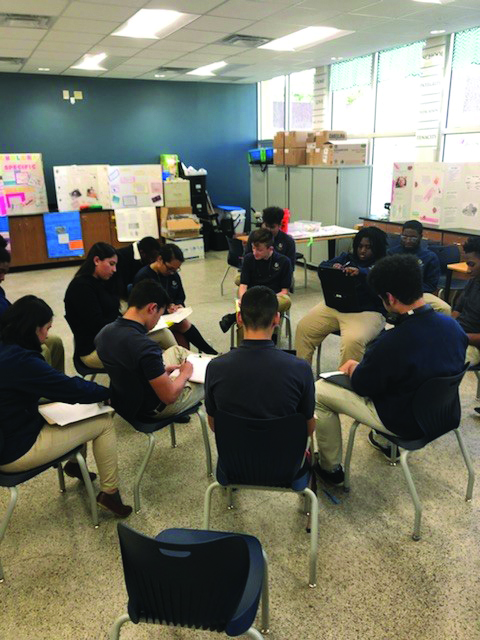There’s More to the REME Awards Than Meets the Eye
Industry recognition is only the outward face of the roll-up-their-sleeves hard work that winners put into their businesses.

Industry recognition is only the outward face of the roll-up-their-sleeves hard work that winners put into their businesses.
You know the old saying about icebergs and what lies below the surface. So it is with the REME Awards, IREM’s annual homage to industry innovation and best practices. The celebration of the awards is only the most outward sign of the hard work that elevates practitioners from product providers to strategic service partners with occupants, our ownership clientele, and the larger local communities. As you are about to read, the play-by-play of four winning management firms makes this point loud and clear.
The Value-Add Proposition
AMO of the Year
MEB Management Services, AMO
Phoenix
Value enhancement is the leading-edge mission of MEB Management Services, IREM’s AMO of the Year. The firm actually charts its periodic value-enhancement progress, and principal Libby Ekre, CPM, reports that for one client, Phoenix-based MEB delivered a whopping 49 percent value increase for the six months that ended in April 2018. Other clients also enjoyed impressive gains, most clustered around the 29-percent range.
“Through its Value Creation Dashboard,” the firm explains in its REME application, “MEB measures increases in NOI at each managed asset and converts [that to the] increase in the value of each asset.” The dashboard is also the major metric of employee performance. We’ll have more on that shortly.
Part of those gains comes in an active management of rental rates. For instance, MEB is property manager for seven Avilla Homes neighborhoods in the Southwest that feature single-level detached rental units. The homes are being developed by NexMetro Communities. “Adjusting to rent increases quickly was integral to making sure we maximized the rents on each property,” says Ekre.
“When you’re in lease-up of a new project, you don’t want to be the highest-priced community,” she explains, adding that rental rates were based on the sub-market and timing. “These properties leased in six to eight months. Once a certain amount were leased in a week—say five—the team would revisit the rental rate to determine how much more they could increase it.” In most cases, the rents were over market because of the uniqueness of the brand, the design of the homes and the overall community feel.
The firm was also integral in selecting the amenities that would appeal to the target renters, millennials and boomers alike. Among those amenities were gated entrances, large private backyards, no walls shared with neighbors, walking trails and dog parks. These all create a “wow factor,” says Ekre.
Value-add owner/developer Bascom Arizona Ventures can tell a similar tale, one that MEB relates in its application: “For the last 10 Bascom acquisitions, representing 3,501 units, MEB was able to achieve an average annual growth in effective gross income of 9.9 percent. Average NOI growth was 13.41 percent.”
The relationship between MEB and clients such as NexMetro and Bascom is based on service, clearly, but service starts with individual team members matched by personality and skill to the appropriate jobs. Enter the firm’s relationship with PDP Global, which provides a management system that aids in the selection, motivation and retention of people.
“It’s about knowing how to manage people based on who they naturally are,” says Ekre. Via PDP, “We scan different behavior profiles for the specific skills and talents that best fit certain roles.” Those profiles also identify stress points so management can better help individuals over those hurdles.
Matching people to their skills for the good of MEB clients is the ultimate value-add.
Training Shifts to High Gear
Corporate Innovation
Cortland Management, LLC, AMO
Atlanta
The development of staff is top-of-mind as well for Cortland, AMO, the Atlanta-based winner of the Corporate Innovation REME Award. Cortland literally put its training into high gear with the creation of a Mobile Training Unit (MTU), a massive, 64-foot tractor/trailer that makes its way to all 11 states (soon to be 12) where the firm has properties to keep staff refreshed in the intricacies of responsive maintenance.
In fact, Jonathan Tucker, CPM, EVP of operations and facilities, reports that since the truck first rolled out in October of 2016, “some 1,200 people have gone through the program,” some in refresher courses, logging a total of 15,000 training hours. The firm works to deliver on a 48-hour service guarantee, says Tucker, “or we refund the rent due for that period.” (He boasts that service is usually complete within 24 hours.) “The MTU helps keep that obligation top-of-mind.”
The trailer, with its dedicated driver, is divided into two sections, Tucker explains. It has a forward compartment for classroom activities like viewing videos and a rear section for hands-on practice
and review through the use of modules that can replicate issues in such areas as HVAC, plumbing, heat pumps and fire safety. There are seven specific modules in all and a total of 58 training classes, covering topics including mold removal, slip and fall prevention and basic first aid.

Cortland’s MTU, taking training on the road.
“For example,” he tells JPM, “we can recreate 136 faults that a technician would find on a typical HVAC unit to see if they can properly diagnose and repair the issue.”
The MTU is on the road throughout the year, targeting specific regions. “We’ll scrub all the service request data for the prior 12 months for all of our regions,” he explains. “We have that data down to specific technicians, and we can see where there might be high demand for specific assistance. So we go to a region and schedule the appropriate people to come in on specific days, so each day is scheduled around the need of the asset or the individuals coming in. We typically stay in each market for about two weeks, longer if necessary.”
The career development that takes place in the MTU can be used for purposes beyond the needs of a particular region. Tucker says that there are CPM training courses that participants can get a leg up on. Specifically, he says, “Managing Maintenance and Budgeting has a direct correlation, as does Marketing and Leasing Multifamily Properties. Marketing and leasing an asset starts with curb appeal and maintaining the exterior. All of that is part of what we teach in the MTU.”
The unique nature of Cortland’s 64-foot training delivery system is based in an essential value proposition: service. “For our residents it’s all about experience,” says Tucker. “The MTU teaches our service associates how to deliver on that vision for our communities.”
Investing in Tomorrow
Corporate and Social Responsibility
ResProp
Tampa
ResProp Management defines community in a clearly global sense, and its outreach to the underprivileged of Tampa proves it. In fact, their efforts in this area are why they received the REME Award for Corporate and Social Responsibility.
Its work actually began in Chicago with ResProp co-founder Peter Rex. There he discovered the Cristo Rey Network of Schools, which serves underprivileged youth by providing a college-prep education with a work-study component while they advance their faith formation. Rex immediately tied that effort to a local Tampa parish, Mary Help of Christians, and work began on establishing a local Cristo Rey school, explains Neal Herman, who is a director at ResProp and serves as the high school’s chairman of the board.

But that was no small task. “Wherever you start a Cristo Rey school,” he explains, “you have to start from scratch. You have to select the site, perform the feasibility study, secure the facilities, recruit the kids and find the job partners. We saw our competitive advantage as providing three things: leadership, the business relationships that would form the initial group of supporting partners, and the necessary facilities management that would turn an old and outdated school building into a new-age, 21st century school.”
The Cristo Rey Network approved the establishment of Cristo Rey Tampa High School and after a comprehensive renovation, the school opened its doors on August 15, 2016. Today, there are 170 students, and Herman anticipates celebrating their first graduation in 2020.
A key to the program is the school’s Corporate Work Study Partnership, essentially a paid internship with local businesses to enhance the students’ business acumen. “That’s the differentiating aspect of the Cristo Rey model,” he explains. “The students get work experience while injecting a beacon of culture into our company. The experience helps them develop social skills and a work ethic in combination with college prep education. They step up, take the challenge of doing five days of coursework plus going to a job and being held accountable for it all.”
With all the talk about the aging of the industry, Herman also says the program is good for the goose as well as the gander. The students “are exposed to property management as an option as they grow throughout their careers,” he says. “We’re trying to unlock opportunities.”
But it’s the immediate benefits that count the most, especially in terms of changing the world view of underprivileged youth, a view that starts out narrowly defined and bounded by limitations. Herman explains that in talking with the students, he has found that involvement with Cristo Rey “changed the way they live their lives, and it’s been a benefit to their entire families. My hope is that through working with us, they can see the multifamily industry as creating value for people at home while providing for themselves and their families.”
Sustainability in Two Acts
Sustainability Programs
Phillips Edison & Company
Cincinnati
The perpetuation of the industry and the environment could be seen as key initiatives for Cincinnati-based Phillips Edison & Co. (PECO), which won two REME Awards, for Employee and
On the first score, PECO’s application explains that its college recruiting and internship program had a good run, “with 10 full-time employees starting their careers with us as interns.” But, in 2016, with the growing war for talent, the firm’s HR and marketing teams began to collaborate on strategies to increase that success rate by accomplishing these goals:
- Better define the program and raise its visibility to make it stand out against bigger brands with bigger budgets.
- Increase internship and recent college graduate applications by 20 percent.
- Highlight interns’ hands-on experience through the program.
- Continue to foster a sense of community for program participants.
The result was PECOI (Phillips Edison & Co. Internship Program), a multitiered program that features “a brand identity created to appeal to interns and recruits”; a “Day in the Life” video that captures a typical day of an intern; a web presence featuring testimonials and applications; and a social media campaign.
The multitiered push rang many of the bells the firm targeted. According to its REME application, Phillips Edison averaged 14 interns per semester in 2015. In the spring of 2018, the firm had 25 interns with 27 slated for the summer semester. In addition, “We received a record number of applications for the 2017 spring and summer semesters, and 2018 topped even those numbers.” PECO has also jumped in its number of college hires, from five in 2016 to 12 in 2018.
In terms of its sustainability program, PECO aligned itself with Blue Sky Utility (a firm that installs GAF TPO roof membrane and solar panels), to enhance the energy efficiency of its California properties.
The pilot property was the Winery Shopping Center in Fairfield, Calif., where in 2016, Blue Sky replaced 70,000 square feet of the property’s roof with GAF TPO membrane and solar panels. As a result, management and tenants now enjoy additional benefits:
- “Roof replacements can cost up to $500,000, and fixing roof leaks is one of our biggest expense line items,” says PECO. “The new, white TPO roofs need much less maintenance and save us time and money on repairs.” Savings are passed on to the tenants.
- Phillips Edison is able to purchase energy to power common areas from Blue Sky at a discounted rate and pass that savings along to tenants as well; and
- “Our tenants are able to buy their power from Blue Sky at a discounted rate. The new reflective roofs also offset heating and air-conditioning costs.”
Based on the success of the pilot, “The program will roll out to 75 percent of our California properties in the next three years, for an estimated savings of over $9.5 million.”
John Salustri is a contributing writer for JPM®. If you have questions regarding this article or you are an IREM Member interested in writing for JPM, please email jpm@irem.org.
Issue: March/April 2019
Similar Posts
Exclusive, REME awards
IREM congratulates the 2023 REME Award finalists
Highlighting excellence in nine categories










